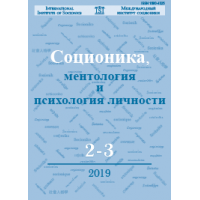Номер № 4-5/2019 журналу «Соціоніка, ментологія та психологія особистості»
Психологія особистості
Букалов А.В., Карпенко О.Б.
Розвиток психологічного знання у світлі досягнень соціоніки
У сучасній З психології накопичено величезний масив експериментальних даних і сформульовано ряд приватних теорій, що охоплюють окремі сфери психічних процесів. Проте цілісне розуміння роботи психіки ще досягнуто. У той же час, інформаційні моделі психіки, пропоновані теорією інформаційного метаболізму — соціонікою, показують можливий шлях до інтеграції великого масиву експериментальних даних, окремих психологічних теорій та концепцій у єдину модель психічних процесів, яка здатна описувати не лише типологічні особливості, а й індивідуальні психологічні профілі особистості.
Ключові слова: психологія, структура психіки, соціоніка, особистість, інформаційна модель психіки, психологічні типи, інтертипні відносини.
Дослідження
Глухарєв К.А., Прокоф'єва Т.М., Прокоф'єв В.Г.
Малі групи «Стилі планування». Частина 1. «Групи релаксації»
У НДІ Соціоніки 2011-2012 гг. було проведено експериментальне дослідження групової поведінки піддослідних при об'єднанні у соціонічні малі групи — «групи релаксації» («Квадрат»). Спостережуваним феноменам було зіставлено поняття із сучасної практики планування економіки та дано нову назву — «Стилі планування». Стаття буде корисною для соціоніків, управлінців та психологів.
Ключові слова: соціоніка, тип інформаційного метаболізму, тетратомія, планування, малі групи, група релаксації.
Коваленко Р. К., Звонарьова Н.А., Ташликова Я.А.
Особливості визначення характеристики «вербальність/лаборність» в діагностиці ТІМу
Розглянуто особливості визначення та маркери характеристики «вербальність / лаборність».
Ключові слова: соціоніка, характеристика функцій, модель А, вербальність, лаборність, квадри , блоки.
Мегедь В.В., Овчаров А.А.
Диференційна соціоніка Мегедь та Овчарова та її технології
Технології диференціальної соціоніки, розроблені авторами, показують високі результати при вирішенні завдань ефективного кадрового відбору та ротації кадрів; виявляють ступінь виразності інтелектуальних, ділових, лідерських, морально-етичних якостей; визначають належність співробітника до певного типу менеджера, з певним стилем керівництва, ефективність його в даному типі організації, його стимули та мотивацію, оптимальну соціальну роль та інші особисті якості.
Ключові слова: соціоніка, особистість , психіка, соціонічний тип, акценти типу.
Математичні методи у соціоніці
Мінаєв Ю.П., Рейнін Г.Р.
Бінарна операція в групі операторів класичних інтертипних відносин
Наведено результати узгодження позицій авторів статті щодо питань, що стосуються введення бінарної операції в групі операторів класичних інтертипних відносин Обговорення цих питань представлено у формі діалогу.
Ключові слова: соціоніка, Аугустинавічюте – Рейніна ознаки (АРПи), Юнга – Мінаєва ознаки (ЮМПи), класичні інтертипні відносини (ІВ), оператор, група , бінарна операція, зворотний елемент, асоціативність.
Дискусії
Рейнін Г.Р.
Трохи про інформацію, її передачу та інформаційний метаболізм
Обговорюється поняття інформації та процес її сприйняття.
Ключові слова: соціоніка, інформація, інформаційний метаболізм, зміст і форма, опис світу.
Головчинер (Новікова) В.Ю.
Соціонічні аспекти оформлення та реконструкції смислів у процесі обміну інформацією
Обговорюється поняття інформації, запропоноване Г.Р. Рейніним, у контексті соціоніки та інтертипних відносин. З використанням моделі А розглянуто особливості кодування та спотворення сенсів інформації при її передачі.
Ключові слова: соціоніка, інформація, зміст, форма, інтертипні відносини, модель А, спотворення сенсу.
Еволюція психіки та антропологія
Букалов А.В.
Про можливу причину зменшення швидкості мутацій у людини порівняно з приматами
Значне зменшення швидкості мутацій у людини — в 3 рази в порівнянні з людиноподібними мавпами, виявлене в генетичних дослідженнях, може бути пов'язане з пропорційним еволюційним збільшенням, більш ніж у три рази, об'ємом мозку людини, або еквівалентним збільшенням ступеня розвиненості психіки та свідомості у процесі антропогенезу. Індикатором цього процесу є пропорційне збільшення кількості операційних осередків короткострокової пам'яті та мислення. Запропоновано гіпотезу, що ефект зменшення мутацій пов'язаний з епігенетичними процесами. При цьому ступінь організації центральної нервової системи, що збільшується, психіки і свідомості знижує швидкість мутацій. Показано, що зростання інформаційної впорядкованості психіки людини зменшує ентропію мутаційних процесів у його генетичному апараті. Це, в свою чергу, показує якісну відмінність психіки людини від психіки тварин. швидкість мутацій.
Соціоніка 4-5/2019
- Модель: выпуск журнала «Соционика…»
-
$3.00
- Ціна в бонусних бали: 30
Рекомендовані товари
Соціоніка 1/2019
Номер № 1/2019 журналу «Соціоніка, ментологія та психологія особистості» Дослідження Таш..
$3.00
Соціоніка 2-3/2019
Номер № 2-3/2019 журналу «Соціоніка, ментологія та психологія особистості» Дослідження К..
$3.00
Соціоніка 6/2019
Номер № 6/2019 журналу «Соціоніка, ментологія та психологія особистості» Типологія Букал..
$3.00




